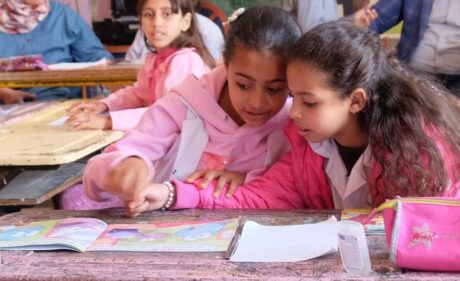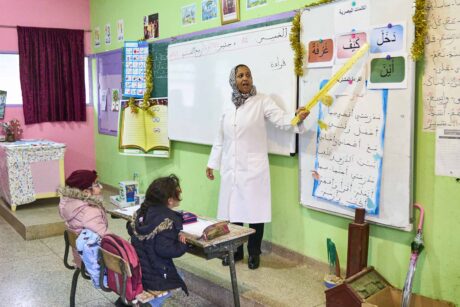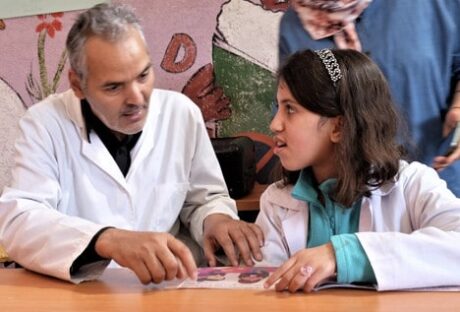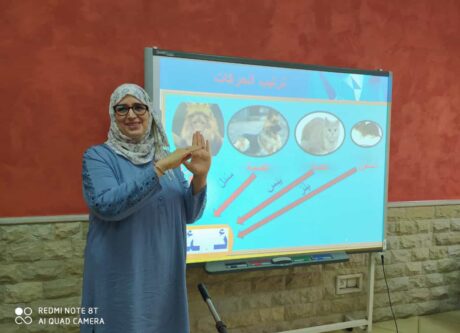Enquanto Ayoub, de 11 anos, agora lê e joga com seus colegas de classe, isso parecia fora de alcance há apenas alguns anos. Ayoub tem uma doença chamada dispraxia, um distúrbio neurológico que dificulta o planejamento e o processamento de tarefas motoras.
Ao redor do mundo, às crianças com deficiência muitas vezes é negado o direito à qualidade, educação inclusiva e equitativa. Do 150 milhões de crianças com deficiência em todo o mundo, uma estimativa 90 por cento estão fora da escola, de acordo com a Organização Mundial da Saúde e UNICEF..
Em Marrocos, de acordo com o 2014 Pesquisa Nacional sobre Deficiência, 66.1 % de crianças e adolescentes com deficiência estão fora da escola porque o sistema educativo não dispõe de recursos para acomodar as suas necessidades. Fora do 1.4 milhões de marroquinos com deficiência, apenas 19.6 percentagem de ensino primário completo, 9.5 percentagem de ensino secundário completo, e 1.8 por cento atinge um nível de ensino superior.
Mas Ayoub e sua família estavam determinados a que sua história fosse diferente.
“Nós realmente sofremos muito com a condição de Ayoub, mas continuamos acreditando nele e não vamos desistir. Todos sonhamos com um futuro brilhante para o nosso menino,”diz o avô de Ayoub.
E com o apoio do Leitura para o Sucesso da USAID - Programa Nacional de Leitura, esse sonho está se tornando realidade.
Uma subida difícil para a educação
Ayoub mora com sua mãe Fátima e seus avós na pequena cidade de Sbaa Ayoun entre Fez e Meknes. Seu pai partiu logo após o nascimento de Ayoub, quando a família soube de sua deficiência..
Quando ele estava 7 anos, ele se matriculou na escola, mas nunca conseguiu passar para a próxima série por causa de sua condição. Determinada para que seu filho tenha uma educação de qualidade, sua mãe conseguiu matriculá-lo em uma escola primária particular, mas Ayoub voltava para casa todos os dias chorando depois de ser intimidado por colegas e ignorado por seu professor.
Ainda comprometido com o futuro de Ayoub, apesar dos obstáculos, a família dele tentou uma aula de necessidades especiais. Ayoub ainda não aprendeu a ler e teve dificuldades para se dar bem com seus professores.
Finalmente, o diretor da escola reconheceu uma centelha no menino e sabia que ele poderia aprender e se destacar no ambiente certo. Ele recomendou que Ayoub se matriculasse em uma aula de intervenção do Programa Nacional de Leitura, onde sua educação pudesse decolar.
Portas abertas para aprendizagem e alfabetização
Quando Ayoub, então com 10 anos, começou a primeira série na escola Al Mokhtar Soussi, aproximadamente 10 milhas longe de casa, o ajuste não foi fácil.
Sem transporte, Ayoub deve chegar à escola a pé, o que é um desafio dada a sua condição. Sua avó caminha com ele, independentemente do clima, às vezes carregando-o nas costas para ir mais rápido e garantir que ele não caia e se machuque na estrada.
Em sua nova escola, Ayoub foi rapidamente abraçado por sua professora Hanane.
“Ele veio à minha sala de aula, e eu pude ver imediatamente que ele estava com medo, perdido e sem esperança”, disse Hanane. “Decidi aceitar o desafio e me comprometi a trazer o sorriso de volta ao seu rosto jovem.”
Enquanto Hanane tentava encontrar o catalisador para despertar o interesse de Ayoub em aprender, ela notou que seu novo aluno se iluminou durante a Hora do Conto, uma nova abordagem pedagógica utilizada no novo currículo de leitura árabe de Marrocos. Hanane foi treinada nesta nova abordagem sob o Leitura para o Sucesso - Programa Nacional de Leitura financiado pela USAID.
Implementado pela Creative Associates International, o programa de cinco anos apoia o governo de Marrocos no desenvolvimento de um programa nacional de alfabetização para melhorar as habilidades de alfabetização em árabe nas séries 1 através 4. Visa melhorar o ensino em sala de aula; expandir oportunidades de leitura corretiva e extracurricular na escola, em casa e na comunidade; e melhorar os sistemas nacionais de aprendizagem e avaliação da leitura e da escrita.
Dentro de duas semanas após ingressar na turma de Hanane e participar do programa de leitura interativa, Ayoub abriu, ganhou confiança, e finalmente comecei a ler palavras.
No sexto mês, Ayoub lia frases e até participava de atividades escolares como teatro, jogos, e atividades de leitura.
“Agora posso ler, contar a partir de 1 para 20, e eu tenho amigos,”diz Ayoub.
Ayoub terminou o ano letivo com notas muito boas em leitura e um renovado senso de confiança. Ele passou as férias de verão praticando a leitura da nota 2 livro que Hanane deu a ele para ajudá-lo a se preparar para o próximo ano letivo.
Hanane se tornou não apenas uma professora, mas também mentor de Ayoub.
“Ayoub veio até mim um dia e disse: 'Bom dia professor!’ com um largo sorriso e um grande abraço,” diz Hanane. “Quando perguntamos a ele o que ele queria se tornar no futuro, ele disse alegremente: “Um professor, assim como minha professora Hanane!”



